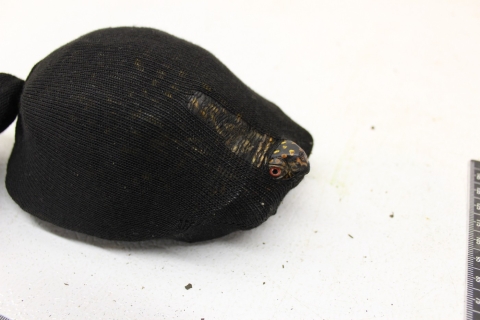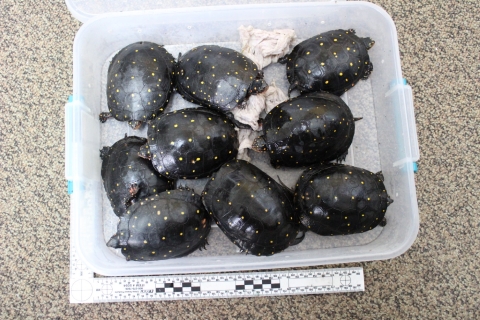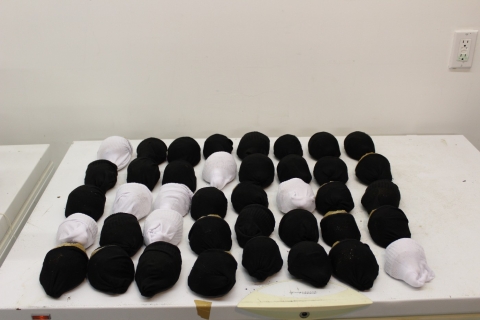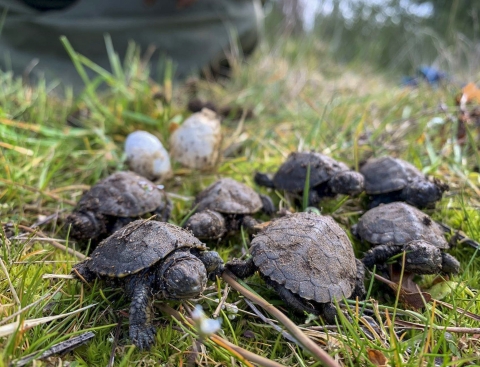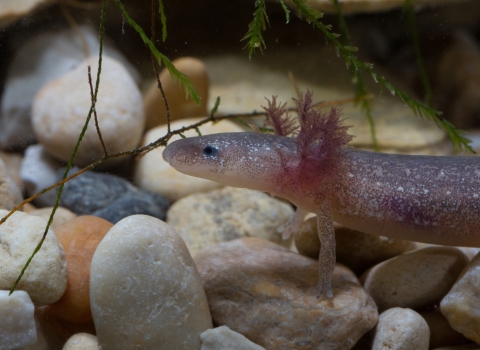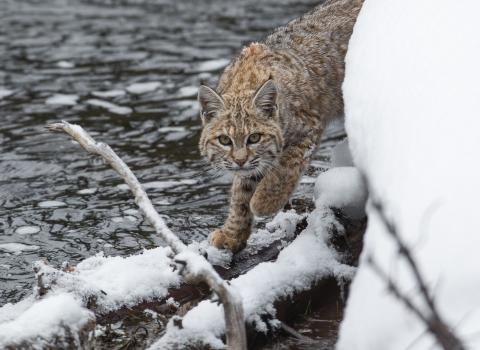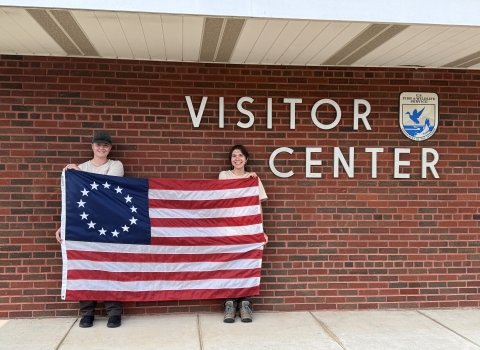Most turtles native to the U.S. don’t travel very far during their long lives. Wood turtles occupy a home range of 60 acres or less. For spotted turtles, it’s no more than eight acres. And eastern box turtles usually stick to an area about the size of two football fields.
But between June 2017 and December 2018, a U.S. Fish and Wildlife Service investigation discovered that at least 1,500 native turtles — including wood turtles, spotted turtles, and eastern box turtles — traveled more than 8,000 miles from the woods and wetlands of the U.S. to Asia.
Collected illegally from the wild for the black-market pet trade, the turtles were smuggled overseas in boxes falsely labeled as books, clothes, and cosmetics to ensure they would slip past U.S. law enforcement and onto a plane.
Each turtle was stuffed in a tight sock, the opening knotted shut. Their limbs were bound to their bodies with tape to keep them from scratching and revealing that there was more than makeup inside.
Kang Juntao didn’t meet the turtles at the airport when they landed, but he paid for their flights.
In December 2020, the U.S. Fish and Wildlife Service, U.S. Department of State, and U.S. Department of Justice, arranged a flight for Kang from Kuala Lumpur, Malaysia, to New Jersey, to face charges for funneling money through U.S. banks for the illegal purchase and shipment of wild turtles.
The extradition of a Chinese national — Kang is from Hangzhou City — who had never set foot in the U.S. for financial crimes connected to wildlife trafficking was a milestone, made possible by close coordination between the U.S government and the government of Malaysia.
Both countries are signatories to the Convention on International Trade in Endangered Species of Wild Fauna and Flora (CITES), an international treaty that restricts trade in species that may be threatened with extinction, including wood, spotted, and eastern box turtles.
In response to a request from the U.S., Kang was arrested by the Royal Malaysian Police at Kuala Lumpur International Airport in January 2019 as he arrived in the country for vacation. The following March, the U.S. Department of Justice and the U.S. Fish and Wildlife Service submitted an extradition request — finalized in the fall of 2020 — to bring Kang to the U.S. to face trial.
Today marked another milestone. Kang was sentenced to 38 months in prison and one year of supervised release on a federal money laundering conviction for financing a ring of individuals who collected, packaged, repackaged, and smuggled turtles out of the U.S.
Special Agent Ryan Bessey was one of them.
Inside job
Bessey had been leading a multi-year investigation into Kang for the U.S. Fish and Wildlife Service’s Office of Law Enforcement when he saw an opportunity for a breakthrough. A confidential informant let him know he’d been contacted about supplying turtles.
“We thought we could make a bigger impact if we could take down the person who was sending the money,” Bessey said. “The most efficient way to do that was to be on the inside.”
The informant connected Bessey to Kang through social media, introducing him as another supplier.
At first, Kang kept Bessey at arm’s length, asking him to send turtles to other intermediaries in the U.S. who would repackage them for international shipment. Eventually, he directed Bessey to ship turtles to Hong Kong as well.
The pace of business was aggressive. In the 18-month period, Kang sent Bessey 40 online payments, amounting to approximately $78,000 — that was to just one of Kang’s “middlemen.”
Bessey used the money to pay other suppliers and turtle poachers, each transaction connecting a dot to help the Office of Law Enforcement target more players.
Like Haixi Sheng, who was a student at Pennsylvania State University when Special Agent Randy Cottrell arrested him for attempting to ship Gulf Coast box turtles to China. Sheng was sentenced to a year in federal prison.
And Yuchao Fang, of Lawrence, Kansas.
It turned out special agents in the U.S. Midwest had keyed into Fang as well, following a lead from a package intercepted at Chicago O’Hare International Airport by wildlife inspector canine handler Amanda Dickson, with help from her canine partner Lancer.
When the agents gathered enough evidence to execute a search warrant for Fang’s residence and car, they discovered more than just turtles; they found child pornography on his devices.
Fang received two separate 60-month sentences for exploiting children and wildlife.
“People who are involved in the illegal wildlife trade are often associated with other criminal activities as well, whether it’s drugs, guns, or child exploitation,” said Special Agent Jared Eatmon, who led the investigation of Fang. “It’s all connected.”
The replacements
Turtles have long been targets of the wildlife trade, whether for food, medicine, or increasingly as status symbols, valued by wealthy collectors for their novelty and beauty.
But the internet has fueled unsustainable growth in an unsustainable industry. Consumers have access to animals anywhere in the world and access to people willing to supply them.
Wildlife trafficking threatens many taxa and turtles are particularly vulnerable to organized exploitation. It typically takes turtles a decade or more to reach reproductive age, and most don’t last that long. They fall victim to natural predators, like birds and fish, when they are tiny, vulnerable hatchlings.
Those that do make it must reproduce for their entire lives to ensure just one hatchling also survives to adulthood to replace them in the population.
When someone takes an individual turtle out of the wild, especially an adult, they might be taking that turtle’s replacement too.
When someone takes hundreds of turtles, they put entire populations at risk, undermining the ecological balance of the complex natural communities they’re part of.
Turtles cannot afford these losses: many populations are already stressed by habitat loss, climate change climate change
Climate change includes both global warming driven by human-induced emissions of greenhouse gases and the resulting large-scale shifts in weather patterns. Though there have been previous periods of climatic change, since the mid-20th century humans have had an unprecedented impact on Earth's climate system and caused change on a global scale.
Learn more about climate change , and roads.
“Poaching adds to the problems turtles face, especially when it’s done in an systematic way,” Special Agent Bessey said. “If someone is paying a network of poachers to scour the woods and pick up every turtle they can find, how long will it take for other turtles to replace them?”
Full circle
Just days before the statutory deadline to transfer Kang to the U.S. was set to expire in December 2020, it was determined that the U.S. Marshal Service team scheduled to escort him would no longer be able to support the mission.
After hustling to coordinate logistics and protocols with multiple federal agencies and foreign governments (during a global pandemic), a team of four special agents from the U.S Fish and Wildlife Service, including Bessey, took a 60-hour round-trip flight to Malaysia to take custody of Kang, just 24 hours before the extradition order ended. If they had been just one day late, a wildlife trafficker would have gone free.
Because of the pandemic, the agents followed strict safety protocols. They couldn’t set foot in Malaysia without undergoing a 14-day quarantine, so instead of passing through customs into the country, they waited for the Malaysian authorities to turn Kang over to them at the international hotel in the Kuala Lumpur airport.
“We literally flew around the world, never leaving an airport,” Bessey said mirthfully. “But it was a good feeling touching back down on U.S. soil with Kang.”
They didn’t bring home any of the smuggled turtles. But by bringing Kang to justice, they prevented hundreds, if not thousands, of other turtles from meeting the same fate.
How you can help
Report suspicious behavior. If you suspect someone is illegally collecting or selling wildlife, contact the U.S. Fish and Wildlife Service by phone (1–844-FWS-TIPS) or through our Wildlife Crime Tips form, or contact your state wildlife agency. The Service is authorized to pay rewards for information or assistance that leads to an arrest, a criminal conviction, civil penalty assessment, or forfeiture of seized property.
Don’t share locations of wild turtles, especially online. It can be exciting to see turtles in the wild, and to share your discovery. But if you post a photo of a turtle on social media, don’t include information on where you found it. Turtle poachers mine the internet for this information and use it to target sites. If you want help identifying a turtle you saw in the wild, reach out to a local nature center or your state wildlife agency.
Before you buy, do your homework. Consider choosing a different type of animal to keep as a pet. Pet turtles require specialized care for decades, so be sure you are ready for the commitment. If you are, don’t shop, adopt. Check local shelters for unwanted turtles. If you buy, be a cautious consumer. Ask for certification that the turtle was captive bred.


